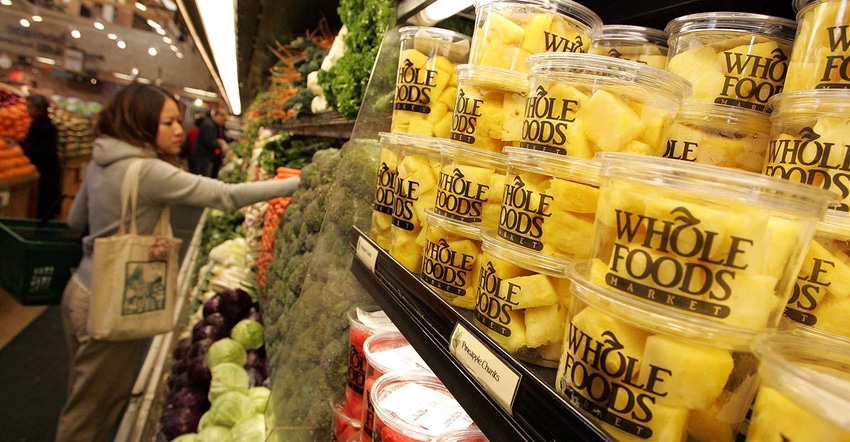
Food today can largely fit into two camps: “industrial” agriculture with commercial farmers focused on low-cost efficiency, and slow, “clean” food made with traceable, specific sustainable practices (organic), often with multiple “absence” claims (no GMOs, no gluten, no antibiotics).
That second camp is not for everyone. Some consumers won’t buy $8-per-pound ground beef when their kids need braces. Even so, a robust community of new food innovators is emerging with a focus on consumer demands. That will lead to a different kind of farming in 2030.
Related: 4 says tech will transform your farm, part 1
“A lot of consumers define healthy as what is not in the food they eat, and millennials say they are willing to pay more for this,” says Natalie DiNicola, president of DiNicola LLC and communications lead for Benson Hill Biosystems. “Transparency is important for these folks.”
Food retailers focus on traits like sustainability and transparency to build trust and loyalty with customers. Traditional brands face new competition from companies like Amazon, which bought grocer Whole Foods, in part to give the company a complete view of customer shopping habits.
“When you couple that with their ability to understand consumer analytics and online habits, it could open up better predictions of what consumers want,” DiNicola says.
Online grocery sales are set to reach $100 billion in 2025. Amazon is the current and expected future leader, representing 25% of all grocery sales.
Traditionally, companies tried to appease consumers on sustainability through pledges and aspirational goals on websites. That builds loyalty, attracts new investors and manages reputation. But as companies integrated these goals into their whole business philosophy, the goals became more tangible and less aspirational. Now food companies compete on social purpose, not just price, taste or quality.
That hasn’t been easy for traditional billion-dollar brands, less trusted by millennials.
The owners of those big brands often outsource innovation through venture capital, or mergers and acquisitions. Two years ago, Campbell Soup launched $125 million Acre Venture Partners to seek out new, innovative food partners.
At the time, Campbell’s CEO Denise Morrison said one reason for the fund is because customers were beginning to distrust legacy brands; they want to know how food is grown, why certain ingredients are used and whether they come from a sustainable source.
Meanwhile Tyson, which processes 1 of every 5 pounds of meat consumed in the U.S., launched its Tyson New Ventures LLC to invest in 100% plant-based proteins. In December, the company spent $55 million to finance Beyond Meat, the leading plant-based protein company.
Why? “They don’t want to be disrupted; they want to be part of the disruption,” DiNicola says.
Blockchain, a digital ledger in which transactions made in cryptocurrency are recorded chronologically and publicly, is already making more waves than you may realize, according to Natalia Kruse, a legal associate with Husch Blackwell.
Blockchain is a decentralized, fixed electronic ledger. That last quality is key: Users cannot edit or delete data in this ledger, which makes the process transparent and builds trust along the food chain.
It’s called a “blockchain” because each line in the ledger represents a block of data that is strung together in a narrative chain, Kruse says. Each individual block represents a single action. The seed is planted. It receives inputs. It is harvested. Further down the chain, data blocks track storage and distribution processes. When coupled with sensors and other precision technology, much of blockchain can be automated, but it is still typically verified by a trusted third party.
“Walmart and IBM are using blockchain to trace mangoes from seed to consumer,” Kruse says, “and the same process they use will be repeated elsewhere in the agriculture industry.”
Walmart and other retailers will use blockchain to maximize shelf life for perishable goods and revolutionize product recalls, making them easy to identify and correct. But there’s definitely a place for blockchain at the farm gate, too.
For starters, the technology could usher in an era of so-called “smart contracts,” Kruse says. Imagine ordering fertilizers, pesticides and other crop inputs and having them delivered without lifting a finger.
Related: 4 ways tech will transform your farm: Part two in a series
“A producer could use sensors in a field to auto-order fertilizer once it is needed,” Kruse says. “The payment would also be automated, once the buyer and seller both confirmed that the product was delivered. That could make a lot of input orders and other record-keeping processes ‘self-executing’ in the near future.”
Farmers could also more easily document sustainability practices and open up more opportunities for premiums by a supply chain eager to satisfy transparency-hungry consumers. It may pay to get onboard sooner rather than later, says Phil Harris, president and founder of ripe.io, an ag tech company developing its own transparent digital food supply chain.
“Early engagement is key because the speed of adoption with this technology is very rapid,” he says.
In part four: How gene editing will revolutionize food production
About the Author(s)
You May Also Like








